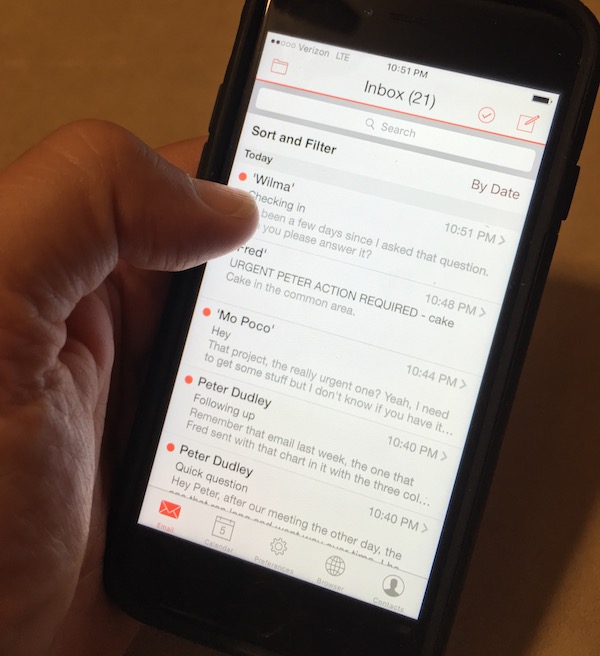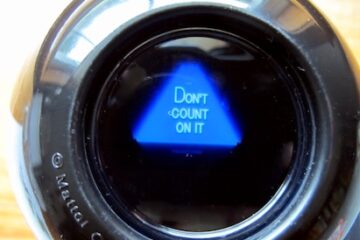Five rules for email subject lines and why you should care
When you see a sign like “Do not offer skateboards to the raccoons,” you know there’s probably an interesting story behind it.
So it goes with every good rant. This is one of those rants. It’s an update of something I wrote a few years ago, when I got so fed up with the daily deluge of pointless emails that I had to let it out somewhere.
This is about email subject lines.
The reason email subject lines exist
Everyone I know gets too many emails every day. They flow in relentlessly—new questions, reply-alls, sales pitches, check-ins, status updates… it’s a deluge.
One thing that can help triage an overflowing inbox is good email subject lines.
You know this. It’s a real treat to get even just one email with a really effective subject line, isn’t it?
A subject line that tells you exactly what the email is about, how important it is, and whether you need to read it immediately or you can pretend you never got it.
These subject lines are rare, and they are gold.
And yet.
Everyone I know who complains about email overload (including me) also sends emails with remarkably useless, stupid, and pointless subject lines like these:
- Thanks
- Following up
- Quick question
- Checking in
- Got a sec for a quick chat?

Bad email subject lines are the opposite of clickbait
That last one above at least passes one (maybe two) of my five tests for an adequate email subject line.
The others tell me the sender did not give any thought at all to how I interact with email.
These are the opposite of clickbait.
Clickbait infuriates me because I know the article won’t live up to its hype-saturated, seductive headline. Usually I skip right past, but occasionally I click. And every time I end up disappointed. Mostly in myself.
The terrible email subject lines above infuriate me because they tell me nothing about what’s in the email. They dare me to skip on past. They are basically begging me to trash the email unread.
But I can’t skip it. Who knows if this particular vapid subject line is hiding a critical and urgent business task?
There’s no way to tell without reading the email.
Perhaps despise is too strong a word. Even resent may be too strong. But these email subject lines give me feelings about the sender.
And the sender could have done so much better if they had just given even a tiny bit of attention to these five rules.
Five rules of good email subject lines
1. Tell me what’s in the email
“Quick question” is the worst offender here. I have never in my life met a “quick question” that had a quick answer. I cannot triage effectively if I don’t know what you’re emailing me about. “Question about the quarterly report” or “I fixed the typos in your press release” are better. Also, please don’t leave a subject line blank.
2. If it’s time-sensitive, say so
Add something like URGENT: to let me know this requires attention now. Better is to add a timeframe. URGENT TODAY or NEED BY JUNE 16 makes it easy to triage and makes it pop if it falls below the fold. If you’re really clever, you might set up a protocol your workgroup can use so you can all search and sort by urgency*.
* Side note about priority flags 🚩in email programs: Don’t assume that the recipient knows what they are or how to use them. If your team decides to use them, be prepared for some people to make every email high priority. DO NOT BE THAT PERSON. When every email is high priority, no email is high priority.

3. If it requires action, say so
Corollary to the prior point, ACTION REQUIRED in a subject line lets me know that something needs to get done. An approval, perhaps, or a compliance step that may be holding up a project. It’s more than just information; you need something from me.
4. If it requires my attention specifically, say so
If you send an email to 100 people with ACTION REQUIRED and only one person actually needs to take action, you deserve a Very Long Timeout. FRED ACTION REQUIRED lets everyone know that Fred is on the hook, but the rest of us also have some need to know* about it. Perhaps to make sure Fred does his job.
* Side note about people who aren’t Fred: If I am not Fred, and if I do not actually have some need to know what’s going on, do not CC or BCC me on this email.

5. Be unique
I remember a particular day when four different people emailed separately about four different topics. Each used the subject line “Following up.”*
In minutes (it seemed), more than twenty emails clogged my inbox with the subject line “Re: Following up”. Most were reply-all “thanks, great to meet you, too!” One of the four threads, however, was about a timely, critical problem.
I wasted a bunch of time wading through the sludge to find that one real problem.
Remember, emails often need to be reviewed later. A folder filled with dozens of threads titled “Re: Re: Re: Re: Following up” is not helpful. “Following up on Joe’s dumb suggestion” is more useful (though you might also need to indicate which of Joe’s dumb suggestions you’re referring to).
* Side note about long subject lines: Remember that some recipients will be using a phone. “Following up on the meeting about action required time sensitive stuff” will show up on a phone as “Following up on…”
Writing good email subject lines is part of being a good person
Good communication is not about how you say something; it’s about how the recipient experiences it.
Too many people treat writing email subject lines like dialing the phone. They might as well just give all their emails the subject ring ring.
Emails have subject lines for a purpose. If everyone used good subject lines, we would all be able to triage our inboxes far more effectively and efficiently.
When you send me an email with the subject “Quick question,” you have told me that you think your time is more valuable than mine.
Rather than spend a few seconds using the provided tool (the subject line) to give me even the smallest bit of important background, you force me to open and read your email just so I can decide (a) if it’s relevant to me at all, and (b) how to prioritize it among the hundreds of others also clamoring for my attention.
Imagine how that inefficiency stacks up with dozens of emails a day, for everyone on the team. Especially when one email goes to a lot of people. As a group, we end up wasting a lot of time and energy.
So please, do us all a favor.
No, strike that. Do us all three favors:
- Do you really need to send that email? And do you really need to copy that person?
- Be clear and brief in the body of the email. More words does not mean better communication.
- Write a useful email subject line.
Happy New Year!
As this is my last post of 2022, I want to wish you all a very happy, safe, healthy, and magical 2023.
As you start this new year, no doubt you are setting yourself goals and maybe even making resolutions. Please let me know how I can help you or your team achieve everything you’re setting out to do.
That’s literally what I’m here for as a professional coach and consultant.
Simply schedule a call with me or drop me an email and we’ll talk. Just make sure to include a useful subject line.
Please.



0 Comments